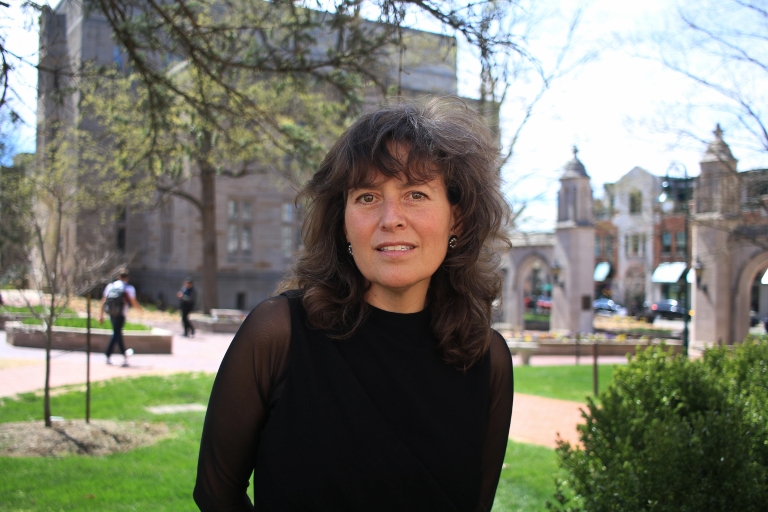BLOOMINGTON, Ind. – Joseph R. Biden will be sworn in as the 46th president of the United States today, but a series of Indiana University surveys found that a significant number of Americans believe false narratives about the validity of the election that he won.
Six surveys conducted by members of IU’s Observatory on Social Media, known as OSoMe, point to the influence of false information posted on social media in the weeks leading up to and immediately after the 2020 presidential election. The results confirm deep political divisions among the population, with social media posts from politicians contributing to the spread of misinformation.

The survey series – which included more than 4,000 respondents of voting age from late August to late November – tested verifiably false statements posted on social media related to the 2020 presidential election. The statements included:
- “Joe Biden is not mentally fit to be president.”
- “Mail-in ballots cause election fraud.”
- “The Centers for Disease Control manipulated the death toll of COVID-19 to exaggerate its impact on Americans.”
- “President Trump faked COVID-19 to win support before the election.”
- “If re-elected, Trump plans to terminate Social Security and Medicare.”
- “Vote-counting machines overcounted the Biden votes.”
- “The number of people who voted is higher than the number of eligible voters.”
Results show about 44 percent of participants were aware of unsupported narratives from both sides of the political spectrum, and about 41 percent believed such stories were true. More than 43 percent of respondents believed that vote-counting machines overcounted the Biden votes, and about 49 percent believe mail-in ballots caused voter fraud. The most believed narrative, at 54.9 percent, was that the FBI “spied” on Donald Trump’s 2016 campaign. The least believed narrative, which about 22 percent of respondents deemed true, was that face masks increase the risk of contracting COVID-19.
“The current state of hardship in our country produces favorable conditions for an infodemic,” said Media School professor Betsi Grabe, a co-author of the study and co-leader of OSoMe. “Uncertainty, anxiety, social isolation, economic hardship and spare time create near-perfect circumstances for unsupported narratives to sweep through social media, stifling access to reliable information, deepening doubt about the trustworthiness of mainstream journalism and fueling political polarization.”
In the most recent survey, researchers found that the unsupported narratives were believed more frequently by supporters of President Donald Trump and Vice President Mike Pence than by supporters of President-elect Joe Biden and Vice President-elect Kamala Harris. That same survey asked participants to respond to the statement, “Democracy is preferable to any other kind of government.” Those with a greater trust in democracy were much less likely to believe untrue narratives than those who said they saw less value in democracy.
Grabe said the implications of the research were dire for the democratic process.
“Democracy hinges on well-informed citizens to select a president,” she said. “And in a post-election era, disinformation narratives, like the ones we are tracking, have the potential to undermine the collective resilience of our nation to rebound on medical, economic and political levels.”
Previous research has determined that unsupported narratives appear to originate more often from the right of the political spectrum than the left, but the study suggest that untrue stories can have an impact on both sides. Grabe said the findings offer evidence of acute political polarization among Americans at an especially challenging time, with the two most polarizing narratives focusing on Biden’s fitness for office and his alleged ties to China.
The fourth survey showed that those who follow politicians on social media were more likely, by up to 26 percentage points, to be aware of false stories, and more likely by as much as 16 percentage points to believe those stories.
“We are justified in pointing fingers to conspiracy theorists, bots and troll factory managers for polluting the social web with disinformation,” Grabe said. “And it is unsettling to add to that list some of the people we elect to represent us. This finding from our study makes me join the growing choir of calls for media literacy efforts to help citizens recognize disinformation. It also adds weight to the urgency for debate on how to regulate disinformation.”
In other results, the researchers found that respondents age 18 to 42 were more aware of and more likely to believe fake narratives than respondents age 43 to 85, as detailed in the fifth survey. Younger participants of all political leanings showed more vulnerability to false information.
OSoMe is a joint project of the IU Network Science Institute, the Center for Complex Networks and Systems Research at the IU Luddy School of Informatics, Computing and Engineering, and The Media School at Indiana University, with support from the Office of the Vice Provost for Research at IU Bloomington. It is funded in part by support from the John S. and James L. Knight Foundation, a nonprofit focused on fostering informed and engaged communities.
About IU Research
IU’s world-class researchers have driven innovation and creative initiatives that matter for 200 years. From curing testicular cancer to collaborating with NASA to search for life on Mars, IU has earned its reputation as a world-class research institution. Supported by $854 million last year from our partners, IU researchers are building collaborations and uncovering new solutions that improve lives in Indiana and around the globe.

